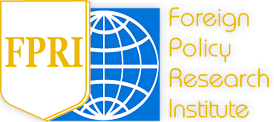NEW PUBLICATION IN RESEARCH OF RUSSIA AND RUSSIAN HYBRID WARFARE
Foreign Policy Research Institute at the Ministry of Foreign Affairs of Ukraine represents to the readers a new edition about the modern Russian-Ukrainian war – the book of prof. Grigoriy Perepelytsia ‘Ukraine – Russia: War in terms of coexistence’

Few believed that in the XXI century, a period of stability in Europe and 25 years of independent Ukrainian state existence, Russia dares to start an insidious military aggression against Ukraine. Such a treacherous attack of ‘the big brother’ has induced many in Ukraine and abroad to rethinking of our ‘fraternal’ relations with Russia. This desire of rethinking has motivated the author to clarify the nature of these relationships and to investigate the roots and driving forces that transformed Russian-Ukrainian relations into the conflict and its highest form manifestation – the war.
In general, Russian-Ukrainian relationships constitute rather complicated conglomerate of interrelations, conflicts and trends, making difficult to describe them relying just on one methodological approach. This creates a risk of one-sided covering of this complex of bilateral relations. Besides, Ukrainian-Russian relations do not fit the format of bilateral relations, as they are considered within the context of interaction approach. Their depth and significance are so great that they often become the subject of multilateral relations and are able to influence some regional systems of international relationships.
Obviously, this historical significance already contains not only the motivation for unity, but also carries a huge conflict potential. The objects or spheres which have a vital public or material importance are usually the subject of conflicts at the same time. Therefore, a comprehensive analysis of Ukrainian-Russian relations cannot be complete and self-sufficient without clarification of these conflictogenic issues.
The other issue that is brought up by the author of this book is what dominates in these relationships – harmony or conflict? Without clarifying of this issue politics cannot be build and further prospects of relations are not to be determined. The study has found out that conflictogenity of Russian-Ukrainian relations lies in the very nature of Russian national interest, which is based on the strong spiritual basis of imperial consciousness of Russian society. There is a powerful request for such aggressive policy in Russian society. Imperial consciousness of these society, in its turn, is a source of conflictogenity in both domestic and foreign policies, since such a request cannot be accepted by other subjects of international relations.
Thus, the general methodological review of the nature of Russian national interest enables us to turn to the main and more important issues: how is national interest interpreted and implemented in relations with Ukraine and what place does it take in the structure of this interest? The answers to these questions allow us to resolve the basic dilemma of Ukrainian-Russian relations: war or peaceful coexistence of Ukraine and Russia as independent states. If the classic of American geopoliticsNicholas Spykman says that a conflict in the international environment is more typical than cooperation, then Ukrainians face a question of how to survive in the war with Russia and to preserve its state sovereignty? If the answer is coexistence – then under what conditions is it possible and how long and stable can it be? History of Ukrainian-Russian relations proves that coexistence of two independent states is possible, but only during a relatively short historical period, in the periods of Russian weakness and, accordingly, establishment of a new balance of power in the international arena at this background, which actually fixed that power imbalances that emerged between Russia and the West in favor of the latter.
The content of the book reveals preconditions and evolution of Russian-Ukrainian conflict, strategic goals and interests of Ukraine and Russia in the war, the peculiarities of Russian hybrid warfare, strategy and tactics of the parties in the war and its international consequences. I hope that readers will find the answers to such vital questions in this book.
